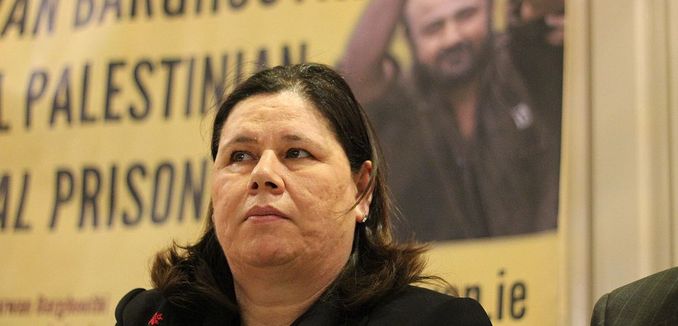How would you describe a man sentenced by a legitimate court of law to multiple life sentences in prison for directing numerous attacks, including suicide bombings, against civilian and military targets?
If your moral compass were intact, you would likely be looking for words such as “remorseless terrorist” or “cold-blooded murderer.”
But if you prefer to apply double standards to Israel and continue to indulge the fantasy that Palestinian terrorism solely springs from economic despair and social paralysis, you might end up calling him a “freedom fighter” and “political prisoner.”
“One man’s terrorist is another man’s freedom fighter,” as the popular dictum goes.
Of course, it is absurd to contend that because people may disagree over who is a terrorist or a freedom fighter, it is therefore impossible to make a morally informed distinction between the two. And Marwan Barghouti, a convicted Palestinian terrorist who masterminded the second intifada, leaves no room for interpretation.
Barghouti is often, in a perverted twist of reality, painted as a Palestinian peacemaker akin to South Africa’s Nelson Mandela. Just this past week, The New York Times ran a piece presenting Barghouti as a mere political leader, a hero of the Palestinian people who has fallen victim to the brutality of the Israeli state.
“He led, she says, but he never killed,” the author of the article, Shaina Shealy, quoted Barghouti’s wife Fadwa as saying. In the sanitized, almost romanticized, re-writing of the Barghouti story, Fadwa is uncritically portrayed as a brave champion for her husband’s release. The author fails to mention that Fadwa herself is no saint, and in 2015 marched in honor of Abu Jihad, a Fatah leader who was implicated in terrorist attacks including the 1978 Coastal Road massacre, which claimed the lives of 38 people, 13 of whom were children.
It was not the first time that the Times manipulated the narrative surrounding Barghouti’s blood-stained past. In April of this year, the paper even agreed to publish an op-ed by Barghouti in which he presented himself as a peace activist and great humanitarian going on hunger strike for the dignity of Palestinian prisoners in Israel. Unsurprisingly, the piece failed to acknowledge that Barghouti was imprisoned after being convicted of multiple murders, and the Times only mentioned his crimes in response to public criticism following the op-ed’s publication.
It would almost be laughable if it wasn’t so horrifyingly offensive to Barghouti’s victims and hadn’t had such serious implications on how the Israel-Palestinian conflict is being portrayed and perceived in the West.
Imagine the outcry if The New York Times had published an op-ed by Timothy McVeigh, one of the Oklahoma City bombers, in which he compared himself to Nelson Mandela. And his byline would have described him as a mere political activist without a hint to the 168 people that he murdered.
The same people cheering on Barghouti would turn upside down in disgust and accuse the paper of being a propaganda tool for terrorists. But the bigotry of low expectations dictates that Palestinians cannot be held to the same moral standards as white people, and therefore the bizarre Barghouti-Mandela comparison lives on.
Of course, Barghouti and Mandela have absolutely nothing in common. To the contrary, the direct comparison between the two unambiguously highlights the difference between a true freedom fighter and a merciless terrorist. Mandela tried to morph hatred and violence into peace and reconciliation. Barghouti undermined peace and reconciliation and embraced hatred and violence.
In his active days, Barghouti was a commander in the Tanzim—an armed wing of Fatah—and the founder of the Al-Aqsa Martyrs Brigade, a terror group deeply involved in planning and carrying out attacks against Israelis. He was convicted in an Israeli civilian court in 2004 on five counts of murder and one attempted murder. He was also implicated and sentenced for his involvement in four other terror attacks.
To this day, his supporters deny the charges and insist that Barghouti was a political leader in the Fatah movement, who rejected violence and was arbitrarily detained by Israel.
We know that this is untrue. Why? Because you only have to follow Barghouti’s own words to understand his true intentions. During the second intifada, Barghouti declared, “The time when only we sacrifice victims is past. We must take revenge. We must kill Israelis. Yes. We have bullets. We have rifles, and they will be aimed at the occupation.”
It is therefore not due to a lack of available information that The New York Times agreed to publish a reprehensible distortion of the truth that shows a remarkable degree of moral myopia.
Barghouti’s past was deliberately whitewashed to serve political ends. Those who defend such individuals, insisting that terrorists like him are freedom fighters, must also lay out what freedoms they are fighting for.
A state in which authorities pay salaries to the families of terrorists? Where an entire generation of children is indoctrinated with hatred for “the other”? Where women are subjugated and homosexuals crushed? Because this is the sad reality in the Palestinian territories today.
This is not freedom. It is terror. Nor are those fighting for it to be considered freedom fighters. And those who forgive it, or support it should not be called anything other than relativists of indiscriminate political violence.
By uncritically publishing Barghouti and his apologists, The New York Times made a mockery of the liberal principles it claims to hold dear. It should bow its head in shame.
[Photo: Sinn Féin / WikiCommons ]




